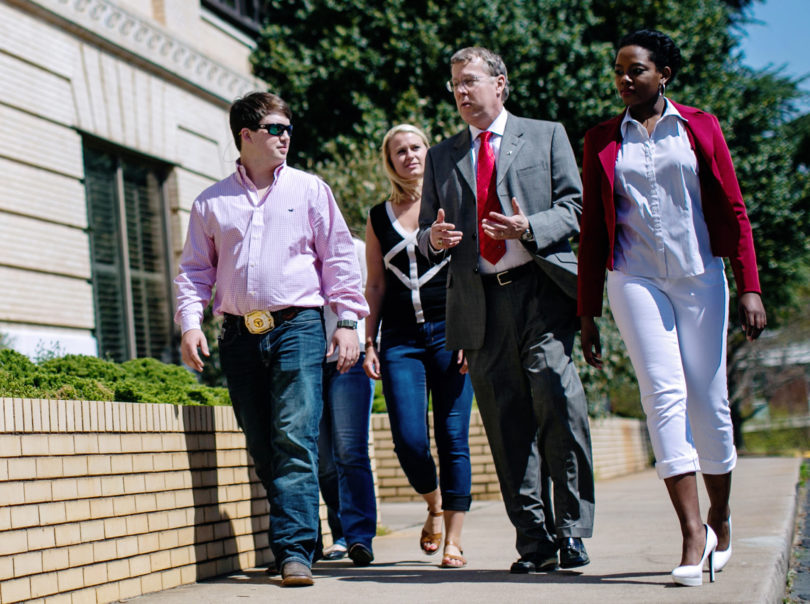In his first five months as dean and director of UGA’s College of Agricultural and Environmental Sciences, Sam Pardue has learned one thing very well: “Georgia is a big state.”
As dean of a college with research and Extension centers, farms, 4-H centers and county Extension offices spread all across Georgia, he’s seen a lot of Georgia; met many of the college’s clients, alumni and friends; and discovered the depth of affinity many have for the college and its programs. But he’s also been getting up to speed on the diversity of Georgia agriculture and the breadth of the university.
“One of the strengths of UGA is that it is a comprehensive university,” Pardue said. “Not only do you have every discipline or area of study within the university, but UGA has a strong law school, journalism, pharmacy, medicine and engineering, too. Because the university is so comprehensive, it lends itself far more easily for us, as a college, to pursue solutions to today’s critical problems.”
Pardue said that agriculture and engineering are historical hallmarks of land-grant institutions, but the comprehensive offerings of arts, language and history bring a richness and diversity to the campus here that you don’t find everywhere.
“There are so many differing opinions, which causes us to pause and think about our own opinions and ideas to find the whole, comprehensive solutions that can only result from diverse input,” he said.
In Pardue’s opinion, it is one of the keys to UGA’s success in agriculture.
“Being able to bring so many schools and experts to the table to find solutions to the very complex food issues facing the world is a real advantage for us,” he said. “This is truly a uni-versity not a poly-versity. We have unity without uniformity.”
Some of those complex problems are access to water resources, labor and immigration policy, and regulatory issues. Solving these critical issues requires multi-disciplinary input from across several colleges from engineering to environment and design, forestry, family and consumer sciences, vet med, public health and others.
“We all have different disciplinary interests,” Pardue said, “but we all work together to solve the most pressing problems of our time.”
Looking forward, Pardue is forming priorities for the college.
“Our priorities are many, but chief among them will be creating access to our degree programs on each of our three campuses, providing focused research and extension initiatives that support Georgia agriculture, and attracting the finest cohorts of students, faculty and staff,” he said.
Pardue also will focus on fostering collaboration across departments, colleges and universities.
“We aim to bring the very best minds into the agriculture arena and convince this generation of students that the field of agriculture is a place where they can build a meaningful career that will address some of the most fundamental challenges of our time,” he said.
Collaboration is second nature to the college that Pardue calls the “cradle of UGA colleges.
“CAES programs and units gave rise to six other colleges or schools within the university,” he said. “That close connection makes collaborative work and research second nature.”
Pardue also plans to use the college’s Office of Diversity Relations and Multicultural Affairs’ multiple pathways in K-12 outreach, community engagement and STEM initiatives to attract a diverse student body.
As UGA raises the bar in its commitment to experiential learning, Pardue points out that’s not a new concept in his college.
“It has been our tradition and history since the college was founded in 1859. From the original university garden that fed the students, it’s been a part of who we are,” he said.
As Pardue enters this new chapter in his academic career, he reflects on the philosophy, mentors and leaders that shaped his career.
“I have often used this statement by Dr. Bill Danforth, former chancellor at Washington University in St. Louis, as a reminder of why we are engaged in the life of the university: ‘A successful university is a noble institution. It is a statement of faith-faith that human beings can be educated and that human thought is worthwhile; that the thinking, analyzing animal called ‘man’ can use his unique talents for the benefit of himself and his fellows; that we can learn from our past; that we can change; that by intelligence, we can improve our lot and the lot of our children and their children.’
“I trust that, in some small way, I might contribute to supporting the University of Georgia as a noble institution,” Pardue said.








